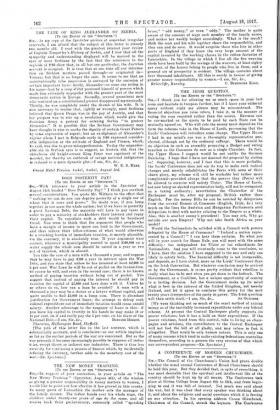DOES POSTERITY PAY?
[To TRE EDITOR or TIM " SPECTATOR:9 But,—With reference to your article in the Spectator of August 11th headed " Does Posterity Pay? " I think you overlook several considerations. You quote Mr. Withers to the effect that " nothing we can do now can deprive posterity of a single ear of wheat that it sows and grows." No doubt true, if you lump together in one MOSS the whole nation; but if we leave to posterity s great National Debt, the majority will have to pay taxes in order to pay a minority of stockholders their interest and repay their capital. To repudiate such a debt would be barefaced fraud. You seem to think that the argument that people who have a margin of income to spare can lend to the Government, and thus relieve their fellow-citizens of what would otherwise bet a crushing burden of immediate taxation, is merely plausible. Inn the contrary, it is absolutely true. If your argument were correct, whenever a municipality wanted to spend 1500,000 on a water supply the whole sum should be raised in a year or two eat of taxation, which is absurd.
You take the case of a man with a thousand a year, and suppose that he may have to pay £100 a year in interest upon the War Debt, and you state that unless Inc has invested at least £2,000 in 5 per cent. War Loan be will be out of pocket on the transaction. of course he will, and even in the second case; there is no known method of paying taxation without being out of pocket. You suggest that instead of paying the interest lie should pay in taxation the capital of £2,000 and have done with it. Unless he sr others do so, how can a loan be avoided? A man with a thousand a year may be a doctor or a lawyer without capital, and quite unable to And S2,000 in a lump sum. There is abundant justification for Government loans; the attempt to defray such colossal expenditure out of immediate taxation would cause untold misery. Another advantage to the taxpayer of loans is this: if you leave his capital to fructify in his hands he may make 10 or 15 per cent. on it and easily pay the 5 per cent. on his share of the National Debt.—I am, Sir, Ac., BERNARD HODSON. Thornton, lfallaingate Road, Sheffield.
[The pith of this letter lies in the last sentence, which is mibstantially accurate, and is conclusive—as our article implied- ao far as the earlier periods of the war are concerned. But as the war proceeds it becomes increasingly possible to suppress all jades- L- ies, except direct or indirect war industries. There is thus less necessity for continuing a process of finance which, by incidentally infiating the currency, further adds to the monetary cost of the war.—En. Spectator.]


























 Previous page
Previous page